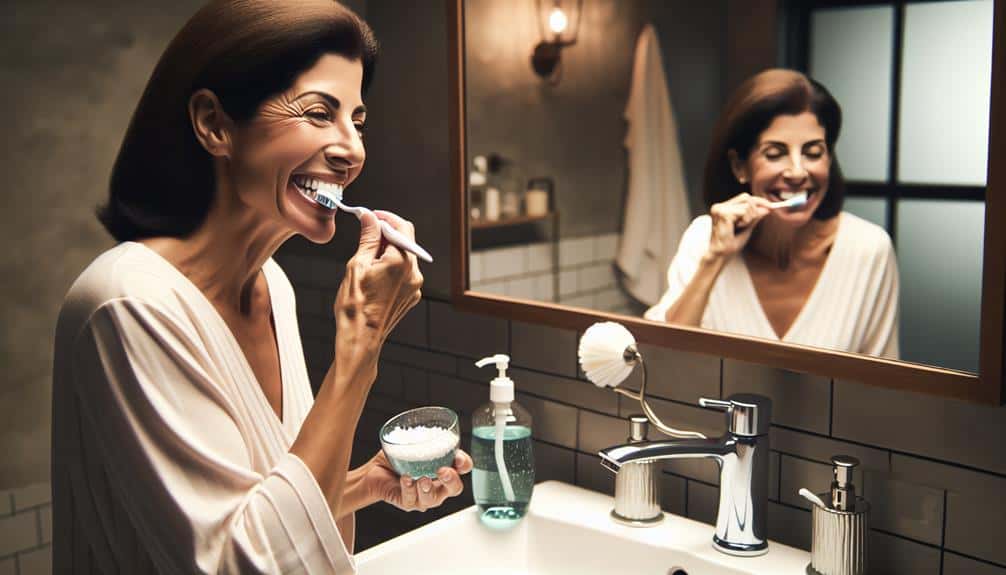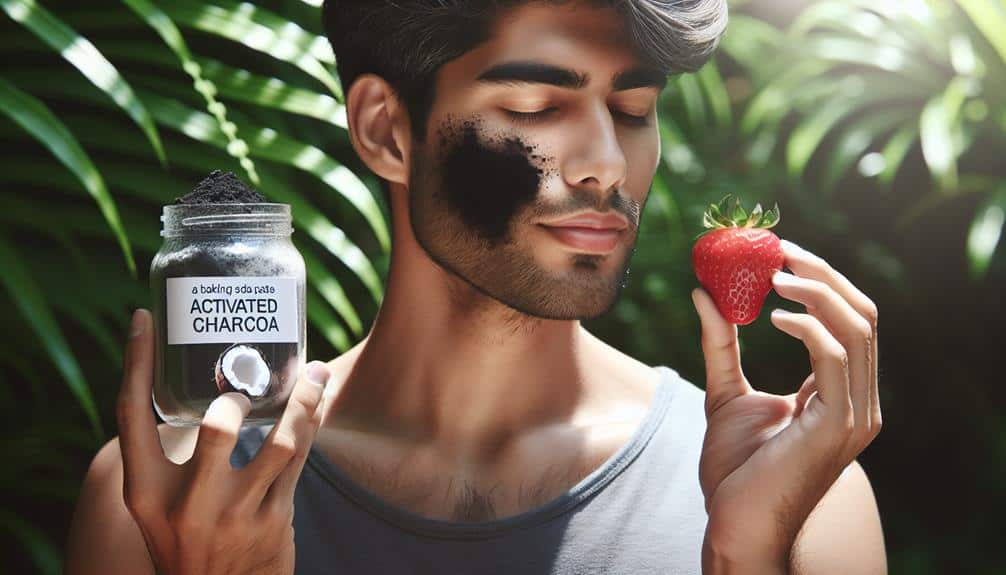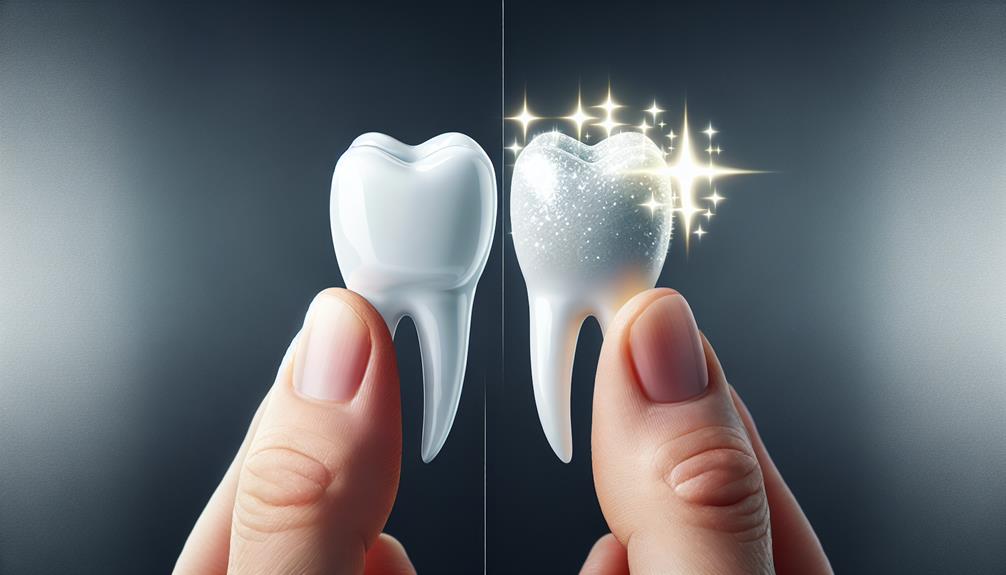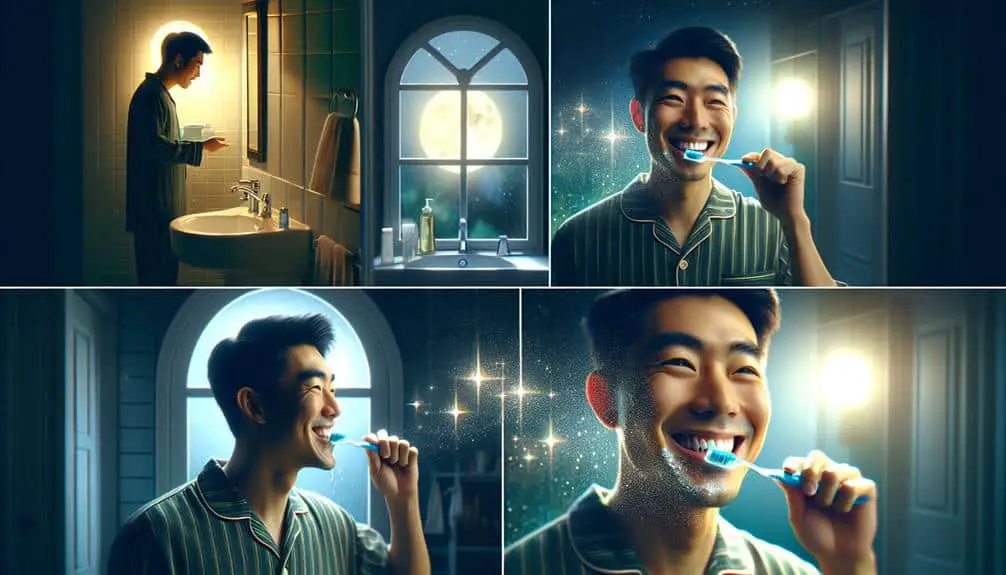To tackle severe tooth stains effectively, start with professional whitening options. Consider in-office treatments with high-concentration bleaching agents or custom trays for personalized whitening. These methods guarantee controlled application of whitening gel for a brighter smile. For at-home remedies, explore natural options like baking soda paste or diluted hydrogen peroxide mouthwash. Maintain long-term results by using whitening toothpaste, flossing daily, and scheduling regular dental check-ups.
Lifestyle choices, such as avoiding staining foods and beverages, can also impact the peak results of whitening effects. Explore the outlined steps to achieve the best outcomes for your severe stained teeth.
Key Points
- Professional dental cleanings remove tough stains effectively.
- Consider in-office whitening for immediate and noticeable results.
- Use custom trays with high-concentration bleaching agents.
- Maintain results with whitening toothpaste and regular dental check-ups.
- Lifestyle changes like avoiding staining foods and drinks for long-lasting whitening.
Understanding Severe Tooth Stains
Understanding severe tooth stains involves identifying the underlying causes that contribute to the discoloration of your teeth. Tooth discoloration can be caused by various factors, such as consuming foods and drinks that stain, like coffee, tea, and red wine. Poor oral hygiene, smoking, and certain medications can also lead to severe tooth stains. Prevention is crucial in avoiding tooth discoloration. Maintaining good oral hygiene practices, such as brushing and flossing regularly, can help prevent severe tooth stains. Additionally, reducing the consumption of staining foods and drinks and quitting smoking can also aid in preventing tooth discoloration.
The impact of severe tooth stains goes beyond just aesthetics. Discolored teeth can affect your self-esteem and confidence, leading to social and psychological implications. Treatment options for severe tooth stains vary depending on the cause and severity of the discoloration. Professional dental cleanings, teeth whitening procedures, and in severe cases, dental veneers or crowns may be recommended by your dentist. Seeking advice from a dental professional to determine the most suitable treatment for your severe tooth stains is crucial.
Professional Whitening Options
Professional whitening options offer effective solutions for combating tooth discoloration and enhancing the brightness of your smile. In-office treatments are a popular choice for those seeking immediate and noticeable results. These treatments are performed by dental professionals and often involve the application of a high-concentration bleaching agent to your teeth. The advantage of in-office treatments is the professional oversight, ensuring the safety and effectiveness of the whitening process.
Custom trays are another professional whitening option that provides a more personalized approach. Your dentist will create custom-fitted trays based on impressions of your teeth. These trays allow for a controlled application of the whitening gel, ensuring that it reaches all the surfaces of your teeth evenly. Custom trays are convenient and can be used in the comfort of your own home, following your dentist's instructions for the duration and frequency of use.
Both in-office treatments and custom trays are effective methods for achieving a brighter smile under the guidance of your dental professional.
At-Home Whitening Remedies
For individuals looking to brighten their smile at home, there are various effective whitening remedies available. When it comes to at-home whitening, natural solutions and DIY treatments can be beneficial for tackling severe stains on your teeth. One popular natural remedy is baking soda, which can be mixed with water to form a paste that helps scrub away surface stains.
Another option is using hydrogen peroxide as a mouthwash, but it's important to use it in diluted form to prevent damage to the enamel.
DIY treatments like activated charcoal have gained popularity for their stain-removing properties. However, it's vital to use these treatments sparingly, as excessive use can lead to enamel erosion. Additionally, oil pulling with coconut oil is believed to reduce bacteria in the mouth and promote whiter teeth.
While these at-home remedies can be effective, it's crucial to use them cautiously and not overdo it to prevent any adverse effects on your oral health. Always consult with a dental professional before trying any new whitening treatment at home.
Maintaining Results Long-Term
To ensure your newly whitened smile lasts, implementing proper oral hygiene practices and making smart lifestyle choices is essential. Consistent oral care is vital for whitening maintenance. Brush your teeth at least twice a day with a whitening toothpaste containing fluoride to prevent staining and maintain the results. Floss daily to remove plaque and debris that can dull your smile. Regular dental check-ups and professional cleanings are indispensable for long-term results. Your dentist can provide touch-up treatments or recommend specific products to help sustain your whitening effects.
In addition to oral hygiene, certain lifestyle choices can impact the longevity of your whitening results. Avoid foods and beverages known to stain teeth, such as coffee, tea, red wine, and berries. If you do consume them, rinse your mouth with water afterward. Quitting smoking can also help maintain a bright smile. By combining good oral habits with mindful choices, you can enjoy your newly whitened smile for the long term.
Lifestyle Habits to Avoid
Implementing healthy lifestyle habits is essential for maintaining the longevity of your whitening results. To prevent the recurrence of severe stains on your teeth, it's important to avoid certain habits and foods that can sabotage your efforts.
Here are three lifestyle habits to steer clear of:
- Harmful Foods: Stay away from foods and beverages that are known to cause stubborn stains, such as coffee, tea, red wine, and dark berries. These items can easily undo the effects of your whitening routine by discoloring your teeth over time.
- Inadequate Oral Hygiene: Neglecting proper oral hygiene practices like brushing and flossing regularly can lead to plaque buildup and surface stains on your teeth. Maintaining a consistent oral care routine is crucial for preventing new stains from forming.
- Smoking and Tobacco Use: Tobacco products contain tar and nicotine, which not only stain your teeth but also harm your overall oral health. Quitting smoking can greatly improve the whiteness of your teeth and reduce the risk of future discoloration.
Frequently Asked Questions
Can Severe Tooth Stains Be Caused by Certain Medical Conditions or Medications?
Medical conditions and medications can indeed cause severe tooth stains. Certain health issues like enamel hypoplasia or medications such as tetracycline can lead to such discoloration. Consulting with a dental professional is essential for proper diagnosis and treatment.
Are There Any Specific Dietary Recommendations to Follow for Maintaining Whitened Teeth?
To maintain whitened teeth, dietary restrictions like avoiding acidic foods are essential. Combine this with impeccable oral hygiene. Lifestyle changes, such as quitting smoking, can further enhance results. Seek professional advice for personalized recommendations.
How Often Should I Visit the Dentist for Touch-Up Whitening Treatments?
For touch-up whitening treatments, visit your dentist as recommended, typically every 6-12 months. Regular dental check-ups guarantee your whitening results are maintained and your overall dental health is in top shape.
Are There Any Natural Remedies or DIY Treatments That Can Help With Severe Tooth Stains?
To address severe tooth stains, consider DIY whitening masks using natural teeth whiteners like baking soda and hydrogen peroxide. These remedies may help brighten your smile, but consult with your dentist for safe and effective options.
Is It Possible to Over-Whiten Teeth and Damage the Enamel?
When whitening teeth, remember, it's possible to over-whiten and harm enamel. Protect enamel by following professional advice. Balance whitening effectiveness with enamel protection. Consult experts for safe at-home remedies to maintain healthy teeth.
Conclusion
You've learned about the best whitening routine for severe tooth stains, but there's one important tip left to share. Remember, consistency is key to achieving and maintaining a brighter smile. Stay committed to your whitening routine, and you'll see remarkable results over time.
Keep up the good work, and don't forget to follow the advice provided to guarantee your teeth stay sparkling white for the long haul. Your journey to a radiant smile starts now!



